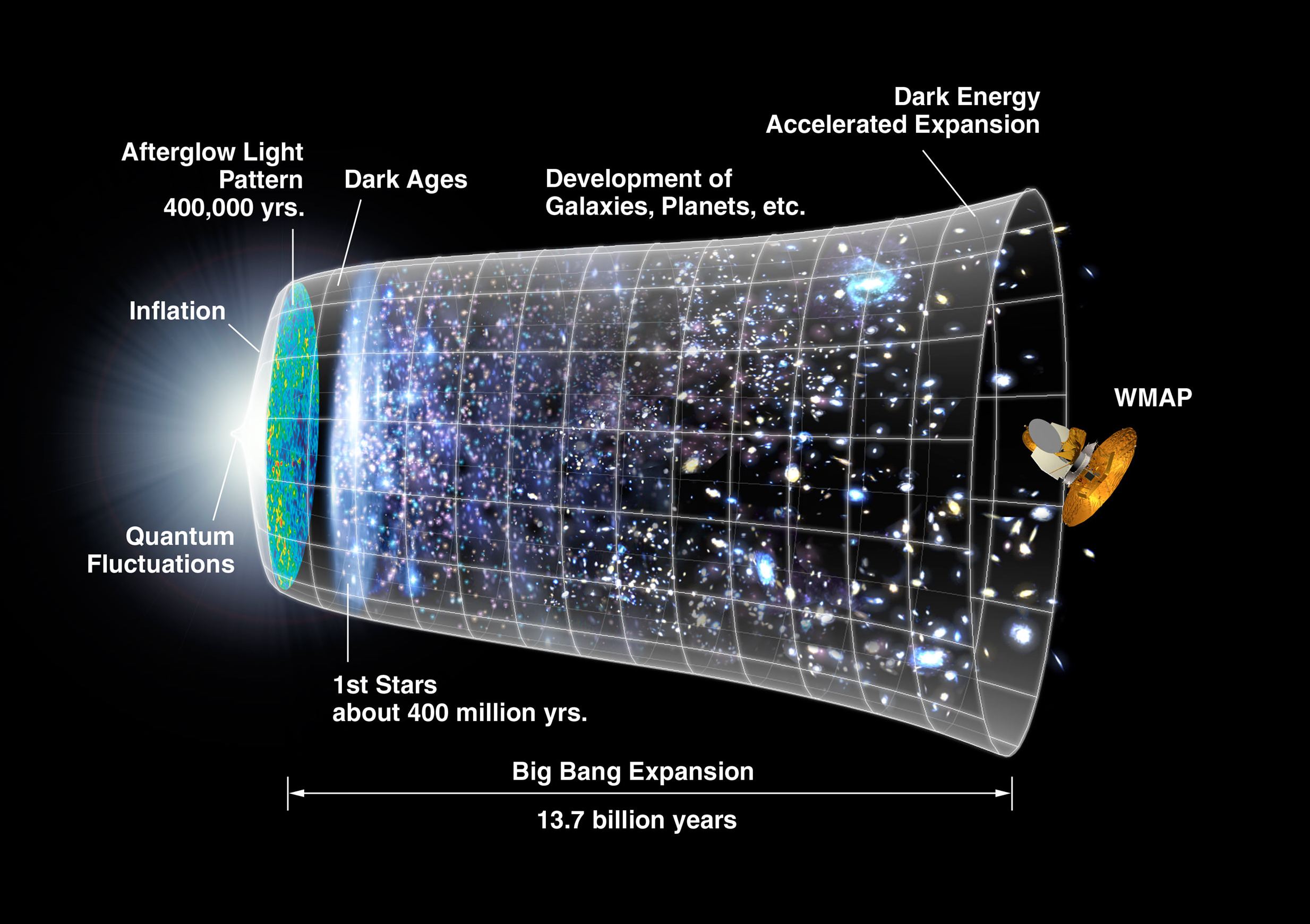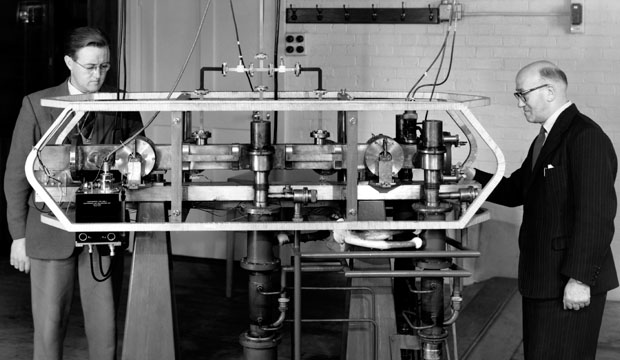Physicists have developed an
atomic clock
so accurate that it would be off by less than a single second in 14 billion years. That kind of accuracy and precision makes it more than just a timepiece. It's a powerful scientific instrument that could measure gravitational waves, take the measure of the Earth's gravitational shape, and maybe even detect dark matter.
How did they do it?
The "Royal Flush" of Clock Performance
Physicists at the
National Institute of Standards and Technology
say their new atomic clock is based on the rare-earth element ytterbium. They use a grid of laser beams called an optical lattice to trap 1000 ytterbium atoms. The atoms naturally "tick" by switching between two energy levels. That action is called
atomic electron transition
, and it takes nanoseconds to occur. Each time they tick, or change energy levels, the electrons emit microwave energy, which can be detected. The NIST physicists built two of these ytterbium clocks, and by comparing them, they have achieved record-breaking performance.
This record-breaking performance is measured in three ways:
- Systematic uncertainty: This is how well the clock represents the natural vibrations of the ytterbium atoms. The ytterbium clock was off by only one billionth of one billionth.
- Stability: This is how much the frequency of the clock changes in a specified time. In this case, they measured their ytterbium clock and it changed by only 0.00000000000000000032) over a day.
- Reproducibility: This measures how closely two ytterbium clocks tick at the same frequency. In 10 comparisons between the pair of clocks, the difference was again less than one billionth of a billionth.
"Systematic uncertainty, stability, and reproducibility can be considered the 'royal flush' of performance for these clocks," project leader Andrew Ludlow said in a
press release
. "The agreement of the two clocks at this unprecedented level, which we call reproducibility, is perhaps the single most important result, because it essentially requires and substantiates the other two results."
[caption id="attachment_140731" align="alignnone" width="600"]
Atomic clocks have been in use for decades. This image shows banks of atomic clocks at the US Naval Observatory, used to define the time standard for the US Dept. of Defense. Image: By US Naval Observatory - http://tycho.usno.navy.mil/gif/clockvaults.jpg, Public Domain, https://commons.wikimedia.org/w/index.php?curid=5538835[/caption]
Clocks, Gravity, and Relativity
Einstein showed us that
time passes differently
depending on the gravity you're subject too. The ticking of the atoms in an atomic clock is slowed down when observed in stronger gravity. On the top of Mt. Everest, for example, time moves more quickly than at the bottom of the Mariana Trench. That's because, here on Earth, the force of gravity is concentrated at the center of the planet. The further you are away from the center, the less gravity there is. The effect is not great, perhaps only millionths of a second. But it's there. That seems counter-intuitive somehow, but that's what Einstein showed, and he's been proven correct.
The exceptional thing about this new atomic clock is that it's demonstrated reproducibility means the clock's error is below our ability to detect the gravitational effect on time here on Earth.
[caption id="attachment_140713" align="alignnone" width="302"]
Physicists at the National Institute of Standards and Technology (NIST) have developed an atomic clock based on the element ytterbium that has broken performance benchmarks for atomic clocks. Physicist Andrew Ludlow pictured. Image Credit: Burrus/NIST[/caption]
NIST physicist Andrew Ludlow explains it like this: "... the demonstrated reproducibility shows that the clocks' total error drops below our general ability to account for gravity's effect on time here on Earth. Hence, as we envision clocks like these being used around the country or world, their relative performance would be, for the first time, limited by Earth's gravitational effects."
The physicists say that now that we have a clock that's accuracy is greater than the gravitational effect on time, we can use the clock to measure Earth's gravitational shape. The usual way of measuring the Earth's gravitational shape is by measuring its tides. Tidal gauges placed around the world are used, but their accuracy is only with several centimeters. The new clocks could bring that accuracy down to less than a single centimeter.
In fact, these
ytterbium
clocks can be used to measure much more than Earth's gravitational shape. They can be used to measure space-time itself, and to detect gravitational waves from the early universe. It's possible that they could even measure dark matter. At this level of accuracy and precision, this instrument is much more than just a clock.
A Portable, Game-Changing Atomic Clock
It's not only gravity that can effect a clock like the ytterbium clock. Other environmental effects can disrupt the device's accuracy. They must be kept cooled and they must be isolated from any stray electrical fields. The new clocks are shielded from electrical and heat effects so that they can be accounted and corrected for.
With improvements like electrical and thermal shielding, the physicists are building portable ytterbium clocks that can be transported to different labs to measure and compare other clocks. They could also be moved to other locations to study relativistic geodesy techniques. This would be a game-changer, because currently, our best atomic clocks are room-sized, so-called "fountain-clocks" which use the caesium atom to define the second.
But that could all be about to change with the new clocks.
Goodbye Caesium, Hello Ytterbium
Previous atomic clocks are based on the element caesium, which up to now provided the most accurate timekeeping available. The vibration of the caesium atom has been used since the 1960s to define the duration of a single second in the International System of Units (ISU). But with the development of the ytterbium clock, caesium's time might be up.
The first caesium clock was built in 1955, and since then it's been the gold standard. The official definition of the second, if you're interested, has been in use since 1967. It says: "The second is the duration of 9 192 631 770 periods of the radiation corresponding to the transition between the two hyperfine levels of the ground state of the caesium 133 atom." Then in 1997 they clarified it to mean the caesium had to be at 0 Kelvin.
[caption id="attachment_140732" align="alignnone" width="620"]
The world's first caesium atomic clock was built at the UK National Physical Laboratory in 1955. Since then, it has been used to define the length of a second. Image: By National Physical Laboratory - http://www.npl.co.uk/upload/img/essen-experiment_1.jpg, Public Domain, https://commons.wikimedia.org/w/index.php?curid=5543813 [/caption]
Other atomic clocks have been built using rubidium, which can be made portable. They're not as accurate as caesium, but they're good enough for applications like GPS, mobile phone base stations, and for controlling the frequency of television stations. But with the development of the new atomic clock using the ytterbium atom, we may have the best of both worlds: unprecedented scientific accuracy, and portability.
The new ytterbium atomic clock is a leading candidate to re-define the definition of how ling one second is. That's because it meets the accuracy threshold defined by the International System of Units. That body said that any new definition would require a 100-fold improvement in validated accuracy over the cesium clocks currently used to define the second.
We used to define time by the rotation of the Earth, but we've come a long way since then. An atomic clock using the tick-rate of a rare-earth element to measure the gravitational shape of the Earth, gravitational waves from the early Universe, and maybe even dark matter is something no historical human could have ever imaged when they stuck a stick in the ground to make a sun dial.
Sources:
- Press Release: NIST Atomic Clocks Now Keep Time Well Enough to Improve Models of Earth
- Research Paper: Atomic clock performance beyond the geodetic limit
- MIT News: Atomic timekeeping, on the go
- Wikipedia: Atomic clock
- Wikipedia: Caesium standard
- Wikipedia: Atomic electron transition
 Universe Today
Universe Today



